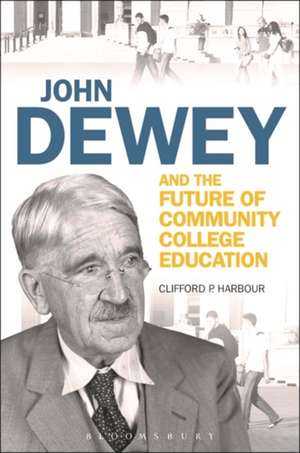John Dewey and the Future of Community College Education
Autor Professor Clifford P. Harbouren Limba Engleză Paperback – 11 feb 2015
| Toate formatele și edițiile | Preț | Express |
|---|---|---|
| Paperback (1) | 190.96 lei 22-36 zile | |
| Bloomsbury Publishing – 11 feb 2015 | 190.96 lei 22-36 zile | |
| Hardback (1) | 714.12 lei 43-57 zile | |
| Bloomsbury Publishing – 11 feb 2015 | 714.12 lei 43-57 zile |
Preț: 190.96 lei
Preț vechi: 222.32 lei
-14% Nou
Puncte Express: 286
Preț estimativ în valută:
36.54€ • 38.25$ • 30.41£
36.54€ • 38.25$ • 30.41£
Carte disponibilă
Livrare economică 10-24 martie
Preluare comenzi: 021 569.72.76
Specificații
ISBN-13: 9781441172921
ISBN-10: 1441172920
Pagini: 192
Dimensiuni: 156 x 234 x 18 mm
Greutate: 0.32 kg
Editura: Bloomsbury Publishing
Colecția Bloomsbury Academic
Locul publicării:New York, United States
ISBN-10: 1441172920
Pagini: 192
Dimensiuni: 156 x 234 x 18 mm
Greutate: 0.32 kg
Editura: Bloomsbury Publishing
Colecția Bloomsbury Academic
Locul publicării:New York, United States
Caracteristici
Combines philosophy and practical application for both the educator, student and college administrator
Notă biografică
Clifford P. Harbour is Associate Professor in the College of Education at the University of Wyoming, USA and President of the Council for the Study of Community Colleges, USA. He was a community college faculty member and administrator for 14 years.
Cuprins
PrefaceIntroduction Part I: The Context1. The Contemporary Community College 2. The Community College of The Future 3. Introducing John Dewey Part II: The Evolution of the Community College4 The Junior College Movement 5. The Great Depression and the Junior College 6. The Late 20th Century Normative Vision 7. Turning to a New Normative Vision Part III: Dewey on Education, Democracy, and Community8. The Relationship Between Democracy and Education 9. The Great Society and the Great Community 10. Dewey and the Great Depression 11. The Deweyan Community CollegeBibliographyIndex
Recenzii
The parallel analyses of the historical evolution of community colleges and John Dewey's work on democracy and education are each rich in their own right, but taken together they provide a critical overview of potential and promise. The author makes a compelling call for community college leaders to purposely advance the use of democratic communities to transform community colleges and create a better democracy.
In John Dewey and the Future of Community College Education, Harbour takes his readers on a provocative journey of the community colleges' landscape, analyzing their humble beginning, their evolving and transformative mission, and their purpose. Harbour explains the development of the community college and its institutional predecessor, the junior college, to show how these democratic institutions acquired their traditional vision of expanding educational opportunity and access. This is a fantastic read for both practitioners and non-practitioners, which will shed some light on the current state of community colleges in the USA and the competing interests and priorities that these institutions must grapple with.
In an era of growing and dangerous inequalities, Cliff Harbour reaches back to John Dewey for the ideas, will and courage to recommit to a new version for what "America's College" should be. Harbour also reminds us of the value of knowing the past and calling forth those ideas that were - and still are - compelling of the betterment of us all. He connects current issues to our collective past and to our values, and identifies what could be lost if we don't change course. This book is well-researched and referenced; it will prove accessible to a wide range of readers.
Harbour provides an alluring overview of the historical evolution of the community college and of the life and times of Dewey. Grounded in this context, he uses battle-tested Deweyan philosophy to articulate a bold, new, and innovative vision for community colleges that prioritizes individual growth and the development of democratic communities. The volume is a must-read for community college practitioners and scholars who seek to improve the institutions capacity to facilitate the upward social and economic mobility of individuals and communities. The volume is written in an accessible tone, which allows readers to envelop themselves in a history and story that compels them to reconsider the future.
In John Dewey and the Future of Community College Education, Harbour takes his readers on a provocative journey of the community colleges' landscape, analyzing their humble beginning, their evolving and transformative mission, and their purpose. Harbour explains the development of the community college and its institutional predecessor, the junior college, to show how these democratic institutions acquired their traditional vision of expanding educational opportunity and access. This is a fantastic read for both practitioners and non-practitioners, which will shed some light on the current state of community colleges in the USA and the competing interests and priorities that these institutions must grapple with.
In an era of growing and dangerous inequalities, Cliff Harbour reaches back to John Dewey for the ideas, will and courage to recommit to a new version for what "America's College" should be. Harbour also reminds us of the value of knowing the past and calling forth those ideas that were - and still are - compelling of the betterment of us all. He connects current issues to our collective past and to our values, and identifies what could be lost if we don't change course. This book is well-researched and referenced; it will prove accessible to a wide range of readers.
Harbour provides an alluring overview of the historical evolution of the community college and of the life and times of Dewey. Grounded in this context, he uses battle-tested Deweyan philosophy to articulate a bold, new, and innovative vision for community colleges that prioritizes individual growth and the development of democratic communities. The volume is a must-read for community college practitioners and scholars who seek to improve the institutions capacity to facilitate the upward social and economic mobility of individuals and communities. The volume is written in an accessible tone, which allows readers to envelop themselves in a history and story that compels them to reconsider the future.














